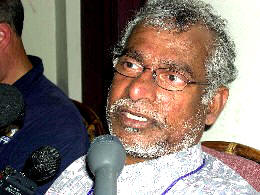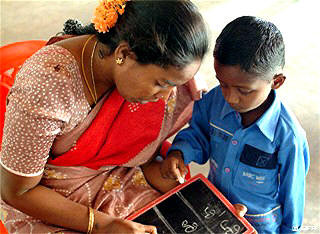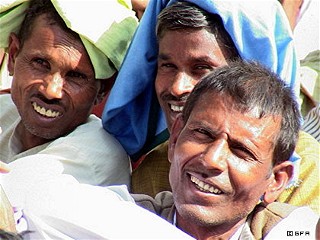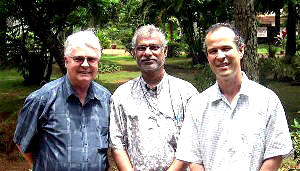
THE LONG AND WINDING ROAD
Gospel for Asia founder K.P. Yohannan describes his life in a poor Indian home, his time in Texas and his call back to Asia By Dan and Peter Wooding in India  Wednesday, August 24, 2005 Wednesday, August 24, 2005 KERALA, INDIA (ANS) -- It’s been an extraordinary long and winding road for K.P. Yohannan. For he has gone from a life in a poor Indian home, to being invited to study God’s Word in Texas, to running one of the largest missions groups in Asia and now being involved in a huge project to help the Dalits, or “untouchables,” of India find Christ. (Pictured: K.P. Yonannan during interview). He agreed to talk about his life during a recent interview at the 54-acre Gospel for Asia Biblical Seminary, which is situated several kilometers away from the busy town of Tiruvalla, Kerala, one of the southernmost states of India. K.P. began by talking about his childhood and how God called him into ministry. “I’m talking to you from about 14 kilometers from where I was born and raised,” he said. “It is a most historic area because it was in AD52, that Thomas, Christ’s disciple, came to India and planted seven churches, and one of those churches happened to be three kilometers from where I was born and raised. “It was a rare privilege that the Lord allowed me to be born in a home where my mother was a devout follower of Christ, and I have five other brothers—I’m the youngest in the family. My father also was a believer. Sadly they both are dead now. My mother prayed for three and a half years—every Friday—fasting, that one of her sons would become a Christian worker and missionary, and when I finished my schooling, the Lord called me to serve Him. “I traveled 2,000 miles north from here and spent eight years serving God there, [with Operation Mobilization] before going to the United States. And so I would say that every mother and father should pray, ‘Lord, call at least one of my children to serve you anywhere.’ And that would be the most precious thing to happen. And I’m grateful that she prayed. She is with the Lord, and I think, you know, my life was spent so far in a way that I think my mother would be happy. PEOPLE HAD NEVER HEARD OF JESUS. When asked what were the biggest challenges for him during those early days when he was traveling from village to village, he replied, “The first shock that I couldn’t figure out was, because I was born in a Christian community with some Christian influence, that when I  went
to north India in the state of Rajasthan, we were going daily from
village to village asking if they’d heard about Jesus, and the most
common answer we got was, ‘Well, we’ve been living here for the last 30
years, 40 years, but no one by that name lives here. Go to the next
village, and most probably you will find him there.’ (Pictured: A
Dalit child receives teaching in one of GFA's primary schools). went
to north India in the state of Rajasthan, we were going daily from
village to village asking if they’d heard about Jesus, and the most
common answer we got was, ‘Well, we’ve been living here for the last 30
years, 40 years, but no one by that name lives here. Go to the next
village, and most probably you will find him there.’ (Pictured: A
Dalit child receives teaching in one of GFA's primary schools). “I was so shocked that people never, ever heard Jesus’ name. It was an awesome challenge when I looked at multitudes; millions of people in these places that did not know Jesus’ name, and that crushed my heart. It was also a way to learn and grow to know what it means to pray and trust the Lord to see changes there. “But then we began to run into places where we were opposed and abused for preaching the Gospel, and I never expected that to happen. Some of us were taken to hospital for beatings, our Bibles were burned, and when we went in to a restaurant to eat our food, we were driven out when the owner recognized we were Christians. And then I remember going back to the New Testament, reading and seeing that this has happened before! I read the Bible before, but it never registered that persecution and beating and suffering for Jesus would be today a reality. Until then, all my Bible reading was a history that happened in the book of Acts, but now it was again being repeated. It was an interesting experience I remember very well.” SHOCK OF MOVING TO TEXAS K.P. then spoke about the culture shock he experienced when he moved to the United States at the invitation of Dr. W.A. Criswell, legendary pastor of First Baptist Church of Dallas, Texas, for more than 50 years. From 1974 to 1979, K.P. attended Criswell Bible College in Dallas, where he earned his B.A. in Biblical Studies. He was also awarded an honorary doctor of divinity degree from Hindustan Bible College in Madras, India. “It was in 1974, when I first came to Dallas, I would say I was completely spaced out for two weeks—not on drugs, but I didn’t know what to think. Everything was new and strange, and sometimes people didn’t know what I was saying until somebody told me, ‘Oh, K.P., just don’t worry about it. You speak English and they speak Texan!’ “It was at the invitation of Dr. Criswell, as a matter of fact, that I came to Dallas to study there, and I am so grateful for the years I heard him and learned the importance of believing God’s Word and preaching God’s Word. But as time went by, I would say the biggest shock was normal culture shock. I had to learn my way. When I first came to America I thought a hot dog was actually dog meat, really, I honestly thought that. “But later I came to the place of absolute confusion. How can the Body of Christ with so much information and affluence be so casual and carnal and shallow? Because I remember going to a prayer meeting where this church had thousands of people attending and the prayer meeting was attended by three or four or five people, that’s all. And that’s the first time it dawned on me that this was a people that really didn’t understand the ways of God. I mean, my experience is very limited. “There are a tremendous number of people who know the Lord and walk with God in America, but those early days I was not traveling enough to find those people. Where I was it was basically a religion rather than knowing Jesus intimately and living for Him so completely.” When asked how hard it was to begin to fulfill the vision God gave you while you were there to mobilize an army of native missionaries in Asia, K.P. said: “The Lord spoke to our hearts so clearly. He called us to give our lives on the behalf of brothers and sisters. That was the only way to reach these nations because Americans and Europeans are not allowed to be here to do missionary work—to baptize and plant churches—and there was no other option. “But as I began to share this with the Body of Christ, I must say looking back there were times I was discouraged and kind of lost my hope, thinking nothing may happen. But the Lord had many lessons for me to learn: not to depend upon the challenge or my expertise or my tears, but rather depend on Him so completely. “And I began to learn that God’s work is His concern, not my concern. I must do what He told me to do. The world going to hell is not my headache, it is God’s headache, and I must wait upon Him for Him to tell me what to do. Sometimes weeks went by. I would be sitting alone just dying to do something, but there was no permission from Him to do anything. “But as I began to learn His ways, wherever the Lord sent me, I was absolutely shocked to find people in tears coming forward to pray and support the work. And what happened in our work so far is nothing less than an absolute phenomenon and a miracle, and I attribute that to God’s grace and His leading. But then I must tell you, as I have traveled to many, many nations, over all these years, that seldom do you run into a group of people like we have in the United States of America. People in the midst of all these problems and all the stupidity, but they have such open, loving, giving hearts. I must tell you I am still amazed at the openness and the willingness to go the extra mile to support and help the work of God. So I would say, yes there were trials, but I think that the good outweighs the bad a hundred times.” K.P. was then asked about the point when he realized that he didn’t have to carry the pressure of the ministry and what we could learn from that. “Well, you know, for us, we have a culture that is now evolved in the last 26, 27 years. That is many, many years ago I came to the conclusion that Jesus is my model. It says in Hebrews, ‘He is my forerunner.’ That means He ran ahead of me and I must follow him. And the Bible is not given for me to obey all the commandments that are in the Bible—the Bible is given to me that I may know Jesus and obey Him. Not in the Old Covenant days—do this, do this, don’t do this, don’t do this—but in the New Covenant days I am called to be a partaker of His nature. THE EMBRACING OF HUMILITY “The nature of Jesus is more than anything else, as He said, ‘I am broken, I am humble, I am lowly. Come and follow me. Learn of me.’ And this is our commitment that as we look at Jesus continually, there’s no other way except to become like Him, and one of the clear indications of someone who knows the Lord is the embracing of humility. It is a choice we make to be a servant, and I think, I would say my greatest joy in serving God with Gospel For Asia is the leaders we have, the senior leaders. About 82 of them that actually run the whole ministry leading the work, and these are men—some of them are Ph.D.’s, some of them have huge amount of background with all kinds of stuff, but they would never tell you—they’d be serving you your food and then next day you might find out this guy went to Oxford and got his Ph.D. He then spoke about how he became a man open to change and this has resulted in the Bridge of Hope project which has resulted in some 35,000 children of the Dalits or untouchables, receiving a free education and food. K.P. admitted that people who had read his early writings might be surprised to hear him say this because he said then that he always believed that social work was “one of the worst enemies of the Great Commission to preach the Gospel to every creature.” He went on to say, “I believed in those days that meeting the physical needs killed our evangelism and church planting in many nations and we didn’t want to do anything like that.” “But then, some years ago we ran into the situation of the Dalits of India,” he said. “There are 300 million of them with 90 percent illiteracy and about 260 million of them are children who are child laborers. Many start their work at the age of four, working from sunrise to sunset, when they go to bed. Some of these kids are chained to the post in the carpet factories, the fire cracker factories or the brick factories, and all they get is eight or nine cents at the end of the day. “That is the tragedy which I had never understood before, and then we realized that unless we touched the lives of these children and gave them an education, there is no way they have a hope nor will we be able to reach the parents. And so the Lord in a marvelous way showed us that if we are to reach these 300 million people the children would be the bridge. “So we began to set up schools amongst these people. And in one place we have 50 schools and in one year we have 37 churches planted. So I think we have about 35,000 children now enrolled. We give the children uniforms, food and education. We call them Bridge of Hope centers and it is the most amazing thing we have ever done. “And I am dreaming of one day that we may have a million of these children knowing Jesus and many of them serving the Lord. “I wish in America we had the freedom like we have here to bridge the school children. And it is a beautiful thing to see these kids, you know, pray and sing choruses, and they go home and tell their parents, and the parents come to us, ‘What has happened to my kid? He looks different. He acts different. She’s different.’ Then we witness to them.” THE DALITS  K.P. then
spoke how his passion is to help the Dalits of India. (Pictured: The
faces of India's Dalits. Every hour two Dalits are assaulted and two
Dalit houses are burned down). K.P. then
spoke how his passion is to help the Dalits of India. (Pictured: The
faces of India's Dalits. Every hour two Dalits are assaulted and two
Dalit houses are burned down).“The Dalits are the lowest of the low caste of India. For 3,000 years they’ve been living in this caste system, and about five years ago they began to talk about leaving Hinduism and embracing Buddhism or Christianity for the sake of freedom from slavery of the Hindu religion. This is when some of us Christian leaders approached the senior-most leaders of the Dalits group—there were 22 of them—and we privately talked to them, and they said, ‘You know what? We know Buddhism is a dead-end. Christianity is the only hope. Would you please come and help us?’ “We were shocked that they were thinking like that. And then there was a major gathering in Delhi where I was invited to speak on behalf of the church, and that actually became the open door for us with a free pass. “In one state of India, some two million of these people represented by their leaders, publicly said, ‘We are all going to become Christians.’ Now, keep in mind, they don’t understand what that means. That only means for them liberation, education, freedom, equality. But for us, it is an ocean of fish that we can catch without trying to figure out where the fish are. “And so we are able to go and preach the Gospel, and those that the Lord knows that are his will respond, will open their hearts, and we are seeing thousands and thousands come into the Kingdom and be baptized. This has been one of the greatest joys. And I believe if the church will continue to pray and send workers, there is no doubt we will see millions turn to the Lord. And this is honestly a hundred times bigger than the reformation under Martin Luther. The significance is so huge.” “The Dalits are nearly 300 million, but then there’s another group called the OBC, the backward caste. That represents about 400 million. Now, they are also in the lower strata of society; the poverty, the illiteracy, all that stuff is also very much their fate. So, potentially, you are talking about 700 million people that without much resistance will respond to the Lord if the Gospel is presented to them. And let’s not make a mistake. You know, in the New Testament, the apostles didn’t have Ph.D.’s and hi-fi theology. They simply cried out, ‘Jesus is Lord!’ You know, ‘God is one, and He loves you, and He died for you, rose again, and if you turn away from your sin, your sins can be forgiven.’ “And the Holy Spirit convicted the hearts of the people and they responded. So our job is very simple: we just need to go and tell the Gospel, instead of going in circles. That’s what we are seeing happening now here in our communities. When asked what his message was to people reading this story and desiring to join in this vision to fulfill the Great Commission in Asia, he replied: “My message is simple. You know, North Americans understand the concept of taking shares in companies and investments and all those things, and I would say if somebody where to tell you, ‘Give me a thousand dollars, in two years you will get back 100 thousand dollars,’ I think everybody would want to do that. That’s a huge return. “I say to you and the believers: Pray for these nations and pray for these opportunities and invest your money. Your return is not one million dollars in a few years, but in terms of return, it is billions of souls!’ “Jesus said, ‘Don’t invest your resources on things that will perish, and it will perish, but invest for souls that will never perish in eternity.’ “Therefore, I would say, ‘Live in such a way that there is no regret when you see the Lord. You will have souls in Heaven. And I do not know any other time when anyone has such a privilege as they do now to join with a ministry like Gospel For Asia, because we are seeing people come to know the Lord in churches planted like never before.” For more information on the ministry of Gospel for Asia, go to www.gospelforasia.org.
|
ASSIST News Service (ANS) www.assistnews.net -- E-mail: danjuma1@aol.com
Across Pacific Magazine | Humour | God at Work | Across Asia | Marine Reach | Rancho de la Paz
 of
ASSIST Europe, and will be leading his first mission trip with the
ministry this summer to Beslan in Russia. Previously Peter served as a
missionary for five years with Youth With A Mission, where he met his
wife who's from North Wales where they now live with their three
daughters.
of
ASSIST Europe, and will be leading his first mission trip with the
ministry this summer to Beslan in Russia. Previously Peter served as a
missionary for five years with Youth With A Mission, where he met his
wife who's from North Wales where they now live with their three
daughters.